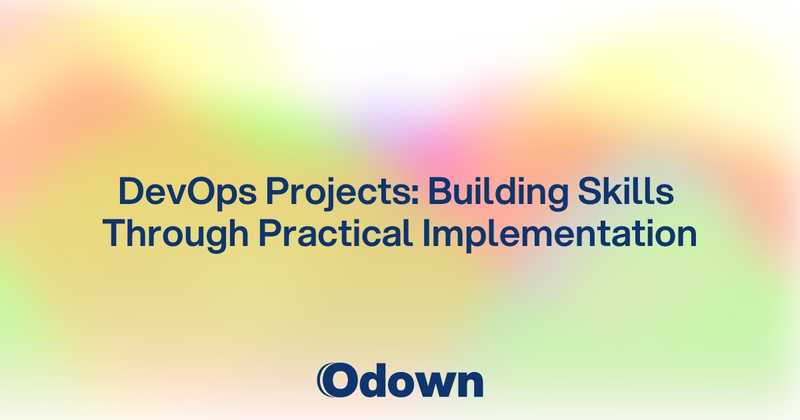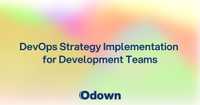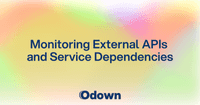DevOps Projects: Building Skills Through Practical Implementation
DevOps has transformed software development and operations, but theory alone won't make you proficient. Real expertise comes from hands-on experience with tools, infrastructure, and deployment pipelines. Projects bridge the gap between conceptual knowledge and practical skills.
Building a portfolio of DevOps projects demonstrates competency to potential employers while solidifying your understanding of core concepts. Each project teaches specific skills, from basic server configuration to complex orchestration systems.
Table of contents
Why DevOps projects matter for career growth
DevOps engineers command high salaries because they solve complex problems. Companies need professionals who can automate deployments, manage infrastructure, and maintain system reliability. Projects provide evidence of these capabilities.
Recruiters can't gauge DevOps skills from resumes alone. A GitHub repository filled with infrastructure code, deployment scripts, and monitoring configurations speaks volumes. Projects show you can work with real tools under realistic constraints.
The technology landscape changes rapidly. New tools emerge while existing ones evolve. Projects keep your skills current and demonstrate adaptability. You'll learn to evaluate tools, implement solutions, and troubleshoot issues independently.
Hands-on experience reveals the nuances that documentation can't capture. You'll encounter edge cases, performance bottlenecks, and integration challenges. These experiences build the intuition that separates competent DevOps engineers from beginners.
Setting up your learning environment
Cloud platforms provide the ideal environment for DevOps projects. AWS, Google Cloud, and Azure offer free tiers sufficient for learning purposes. Create accounts on multiple platforms to gain exposure to different services and interfaces.
Local development environments serve specific purposes. Docker Desktop enables container experimentation without cloud costs. VirtualBox or VMware support virtual machine projects. Vagrant automates VM provisioning for consistent development environments.
Version control becomes critical for project success. Git repositories track infrastructure code changes and provide collaboration capabilities. GitHub Actions, GitLab CI/CD, and similar platforms enable automated testing and deployment pipelines.
Infrastructure as Code (IaC) tools form the foundation of modern DevOps practices. Terraform manages multi-cloud infrastructure provisioning. Ansible handles configuration management and application deployment. CloudFormation works specifically with AWS resources.
Beginner DevOps projects
Server performance monitoring script
Build a command-line tool that analyzes system performance metrics. The script should collect CPU usage, memory consumption, disk space, and network statistics. Output results in both human-readable format and JSON for programmatic consumption.
This project introduces system administration concepts and scripting skills. You'll learn to interact with operating system APIs, handle data formatting, and create user-friendly interfaces. Extend the script with alerting capabilities when metrics exceed defined thresholds.
Automated log archival system
Create a tool that automatically archives application logs based on age and size criteria. The system should compress old logs, move them to designated storage locations, and maintain configurable retention policies.
Log management represents a common operational challenge. This project teaches file system operations, scheduling with cron jobs, and data lifecycle management. Consider adding features for log parsing, pattern matching, and automated cleanup.
Nginx log analyzer
Develop a utility that processes web server logs and generates useful reports. Extract information about request patterns, response codes, user agents, and geographic distribution of visitors. Present findings through terminal output or simple HTML reports.
Web server log analysis provides insights into application performance and user behavior. You'll work with regular expressions, data aggregation techniques, and basic reporting. This project builds skills applicable to observability and monitoring systems.
Static website deployment with GitHub Actions
Set up automated deployment for a static website using GitHub Actions. The workflow should trigger on repository commits, build the site using a static site generator like Jekyll or Hugo, and deploy to GitHub Pages or another hosting platform.
Continuous deployment represents a core DevOps practice. This project introduces CI/CD concepts, automated testing, and deployment strategies. Start simple with basic deployment, then add features like branch-based environments and deployment notifications.
Basic server configuration and SSH setup
Provision a Linux server on a cloud platform and configure it for remote access. Install security updates, configure SSH key authentication, set up a firewall, and disable unnecessary services. Document the configuration process and create automation scripts.
Server hardening and remote access configuration are fundamental DevOps skills. You'll learn security best practices, system administration, and documentation techniques. This project provides a foundation for more complex infrastructure work.
Docker containerization project
Take an existing application and containerize it using Docker. Create a Dockerfile that packages the application with its dependencies, optimize the image size, and configure the container for production use. Include health checks and proper logging configuration.
Containerization has become standard practice for application deployment. This project teaches Docker concepts, image optimization techniques, and container best practices. Build upon this foundation with orchestration tools like Docker Compose or Kubernetes.
Intermediate DevOps projects
Configuration management with Ansible
Create Ansible playbooks that configure multiple servers with consistent settings. Manage user accounts, install software packages, configure services, and deploy applications across different environments. Implement proper inventory management and variable handling.
Configuration management tools eliminate manual server configuration tasks. Ansible provides an accessible entry point into infrastructure automation. This project teaches idempotent operations, inventory management, and configuration templating.
Infrastructure provisioning with Terraform
Write Terraform configurations that provision complete environments on cloud platforms. Include compute instances, networking components, storage systems, and security groups. Implement modules for code reusability and maintain separate state files for different environments.
Terraform enables infrastructure versioning and reproducible environments. You'll learn declarative programming concepts, state management, and infrastructure planning. This project provides experience with complex dependency management and resource lifecycle operations.
Multi-container application deployment
Design and deploy a multi-service application using Docker Compose. Include a web application, database, caching layer, and load balancer. Configure inter-service communication, persistent storage, and environment-specific settings.
Modern applications consist of multiple interconnected services. Docker Compose simplifies local development and testing of distributed systems. This project teaches service orchestration, networking concepts, and data persistence strategies.
Automated database backup system
Build a system that automatically backs up databases on a scheduled basis. Support multiple database types (PostgreSQL, MySQL, MongoDB), implement retention policies, and store backups in cloud storage. Include backup verification and restoration procedures.
Database backup automation prevents data loss and enables disaster recovery. You'll work with database administration tools, cloud storage APIs, and scheduling systems. Consider adding encryption, compression, and backup integrity checking.
Bastion host implementation
Set up a bastion host that provides secure access to private infrastructure. Configure VPN connections, implement multi-factor authentication, and establish audit logging for access attempts. Create documentation and access procedures for team members.
Bastion hosts provide secure entry points into private networks. This project teaches network security concepts, VPN configuration, and access control mechanisms. Security auditing and compliance become important considerations.
File integrity monitoring system
Develop a system that monitors critical files for unauthorized changes. Implement checksum verification, detect modifications in real-time, and generate alerts when suspicious activity occurs. Store integrity data securely and provide reporting capabilities.
File integrity monitoring helps detect security breaches and configuration drift. You'll learn cryptographic hashing, file system monitoring, and alerting mechanisms. This project introduces security concepts applicable to compliance and incident detection.
Advanced DevOps projects
Blue-green deployment pipeline
Implement a blue-green deployment strategy that enables zero-downtime updates. Create infrastructure that supports parallel environments, automate traffic switching between versions, and include rollback procedures for failed deployments.
Blue-green deployments minimize service disruption during updates. This project teaches advanced deployment strategies, load balancer configuration, and automated testing procedures. Database migration handling becomes a complex challenge to solve.
Comprehensive monitoring with Prometheus and Grafana
Deploy a complete monitoring solution using Prometheus for metrics collection and Grafana for visualization. Configure exporters for different services, create meaningful dashboards, and implement alerting rules based on service-level indicators.
Monitoring systems provide visibility into application and infrastructure performance. You'll learn metrics collection, time-series databases, and visualization techniques. This project covers alerting strategies, dashboard design, and performance troubleshooting.
Service discovery with Consul
Implement service discovery using HashiCorp Consul for a distributed application. Configure service registration, health checking, and dynamic configuration management. Include load balancing based on service health and availability.
Service discovery enables dynamic infrastructure where services can find and communicate with each other automatically. This project teaches distributed systems concepts, health checking mechanisms, and configuration management at scale.
Multi-service container orchestration
Design a complex containerized application with multiple services, databases, and external dependencies. Optimize container images, implement health checks, configure resource limits, and establish inter-service communication patterns.
Large-scale containerization requires careful planning and optimization. You'll learn advanced Docker techniques, resource management, and performance tuning. Consider implementing service meshes and advanced networking configurations.
Kubernetes cluster deployment
Deploy and manage a Kubernetes cluster from scratch. Configure master and worker nodes, implement pod networking, set up persistent storage, and deploy sample applications. Include cluster monitoring, logging, and backup procedures.
Kubernetes represents the current standard for container orchestration. This project provides deep experience with cluster administration, pod scheduling, and storage management. Security configurations and role-based access control add complexity.
Project implementation strategies
Start with clear objectives for each project. Define what you want to learn, which tools you'll use, and how you'll measure success. Write down assumptions and constraints before beginning implementation.
Documentation becomes part of the project deliverable. Create README files that explain the purpose, setup instructions, and usage examples. Document design decisions, troubleshooting steps, and lessons learned during development.
Version control enables experimentation without fear of losing progress. Create feature branches for different aspects of the project. Use meaningful commit messages that explain changes and reasoning.
Testing validates that your solutions work correctly. Write scripts that verify functionality, check configuration correctness, and validate security settings. Automated testing catches regressions when making changes.
Incremental development prevents overwhelming complexity. Build basic functionality first, then add features progressively. Each iteration should produce a working system that demonstrates core concepts.
Building a DevOps project portfolio
GitHub repositories provide the standard platform for showcasing DevOps projects. Organize code logically, include comprehensive documentation, and add visual elements like architecture diagrams and screenshots.
Project diversity demonstrates breadth of knowledge. Include projects covering different aspects of DevOps: infrastructure provisioning, configuration management, monitoring, security, and deployment automation.
Real-world applicability makes projects more compelling. Choose problems that actual companies face rather than artificial examples. Scale and complexity should reflect professional environments.
Professional presentation matters for career advancement. Use consistent formatting, clear explanations, and proper grammar. Include badges for build status, test coverage, and documentation quality where applicable.
Open source contributions complement personal projects. Contributing to established tools shows collaboration skills and exposes you to production-quality codebases. Start with documentation improvements, then progress to code contributions.
Common pitfalls and how to avoid them
Overengineering represents a frequent mistake in personal projects. Focus on solving the core problem before adding advanced features. Simple solutions that work reliably are better than complex systems that fail unpredictably.
Security often gets overlooked in learning projects. Always implement proper authentication, encrypt sensitive data, and follow security best practices. These habits become important when working with production systems.
Poor documentation makes projects difficult to understand and maintain. Write documentation as you build, not as an afterthought. Explain not just what the code does, but why design decisions were made.
Ignoring monitoring and logging creates blind spots in your systems. Include observability from the beginning of each project. Practice troubleshooting techniques and incident response procedures.
Vendor lock-in limits project portability and learning opportunities. Use open standards and portable technologies when possible. Learn multiple cloud platforms rather than specializing in just one.
Tools and technologies to focus on
Cloud platforms provide the infrastructure foundation for modern DevOps practices. Learn at least one major platform (AWS, Azure, Google Cloud) thoroughly, then gain familiarity with others. Understanding differences helps with multi-cloud strategies.
Infrastructure as Code tools enable reproducible and version-controlled infrastructure. Terraform works across multiple cloud providers. CloudFormation integrates deeply with AWS services. Ansible handles both infrastructure and configuration management.
Containerization technologies have become standard for application packaging and deployment. Docker provides the foundation, while Kubernetes offers orchestration at scale. Container security and optimization become important advanced topics.
CI/CD platforms automate the software delivery pipeline. GitHub Actions integrates well with code repositories. Jenkins offers extensive plugin ecosystems. GitLab provides complete DevOps platforms in single solutions.
Monitoring and observability tools provide system visibility. Prometheus and Grafana form popular open-source stacks. DataDog and New Relic offer comprehensive commercial solutions. Log aggregation with ELK stack or similar tools becomes necessary at scale.
| Category | Tools | Use Cases |
|---|---|---|
| Infrastructure | Terraform, CloudFormation, Pulumi | Resource provisioning and management |
| Configuration | Ansible, Chef, Puppet | Server configuration and application deployment |
| Containers | Docker, Podman, containerd | Application packaging and runtime |
| Orchestration | Kubernetes, Docker Swarm, Nomad | Container scheduling and management |
| CI/CD | Jenkins, GitHub Actions, GitLab CI | Automated testing and deployment |
| Monitoring | Prometheus, Grafana, DataDog | System observability and alerting |
| Version Control | Git, SVN, Mercurial | Code and configuration versioning |
| Cloud Platforms | AWS, Azure, Google Cloud | Infrastructure and managed services |
Measuring project success and learning outcomes
Technical skills development can be measured through project complexity and tool proficiency. Track which technologies you've implemented successfully and which areas need improvement. Set specific learning goals for each project.
Problem-solving abilities improve through encountering and resolving challenges. Document issues you face and solutions you discover. This creates a personal knowledge base and demonstrates troubleshooting skills to potential employers.
Portfolio quality indicators include code organization, documentation completeness, and project functionality. Regular review and improvement of existing projects maintains portfolio relevance and demonstrates continuous learning.
Industry relevance ensures your skills match current market demands. Follow DevOps trends, participate in community discussions, and align project choices with job market requirements. Professional networking through project sharing builds valuable connections.
Performance metrics provide objective measures of project success. Track deployment times, system reliability, resource utilization, and other quantifiable outcomes. These numbers demonstrate the business value of DevOps practices.
DevOps projects transform theoretical knowledge into practical expertise. Each project builds upon previous learning while introducing new challenges and technologies. Success comes from consistent practice, continuous learning, and systematic skill development.
Building reliable systems requires more than just technical knowledge—it demands robust monitoring and alerting capabilities. Odown provides comprehensive uptime monitoring for websites and APIs, SSL certificate monitoring to prevent security lapses, and customizable status pages to keep stakeholders informed during incidents. These monitoring capabilities become particularly valuable as your DevOps projects scale from simple experiments to production-ready systems.



